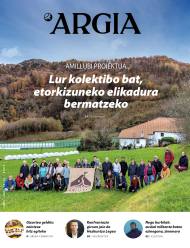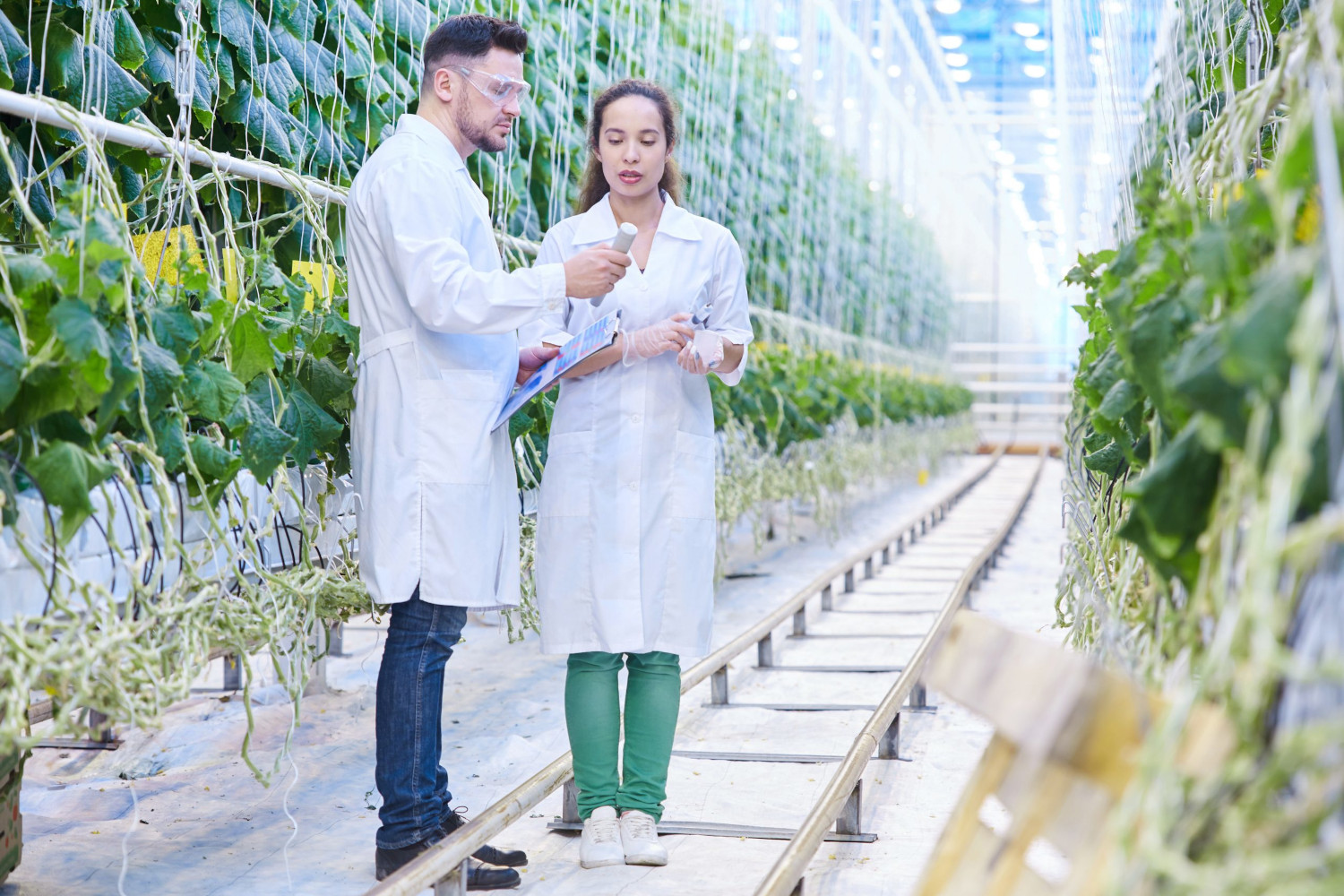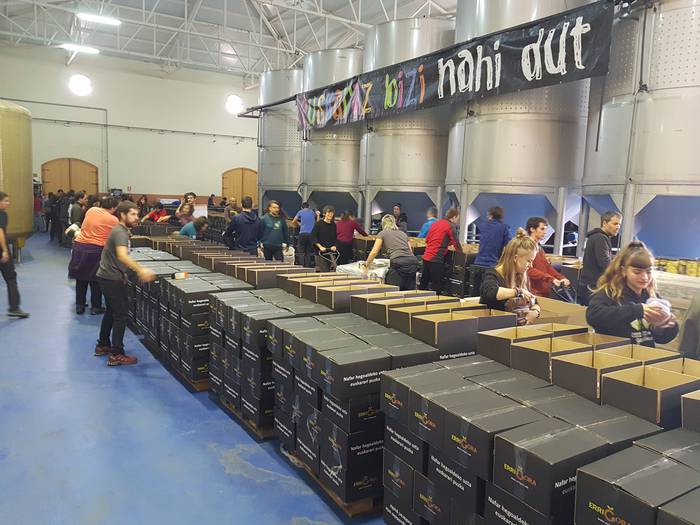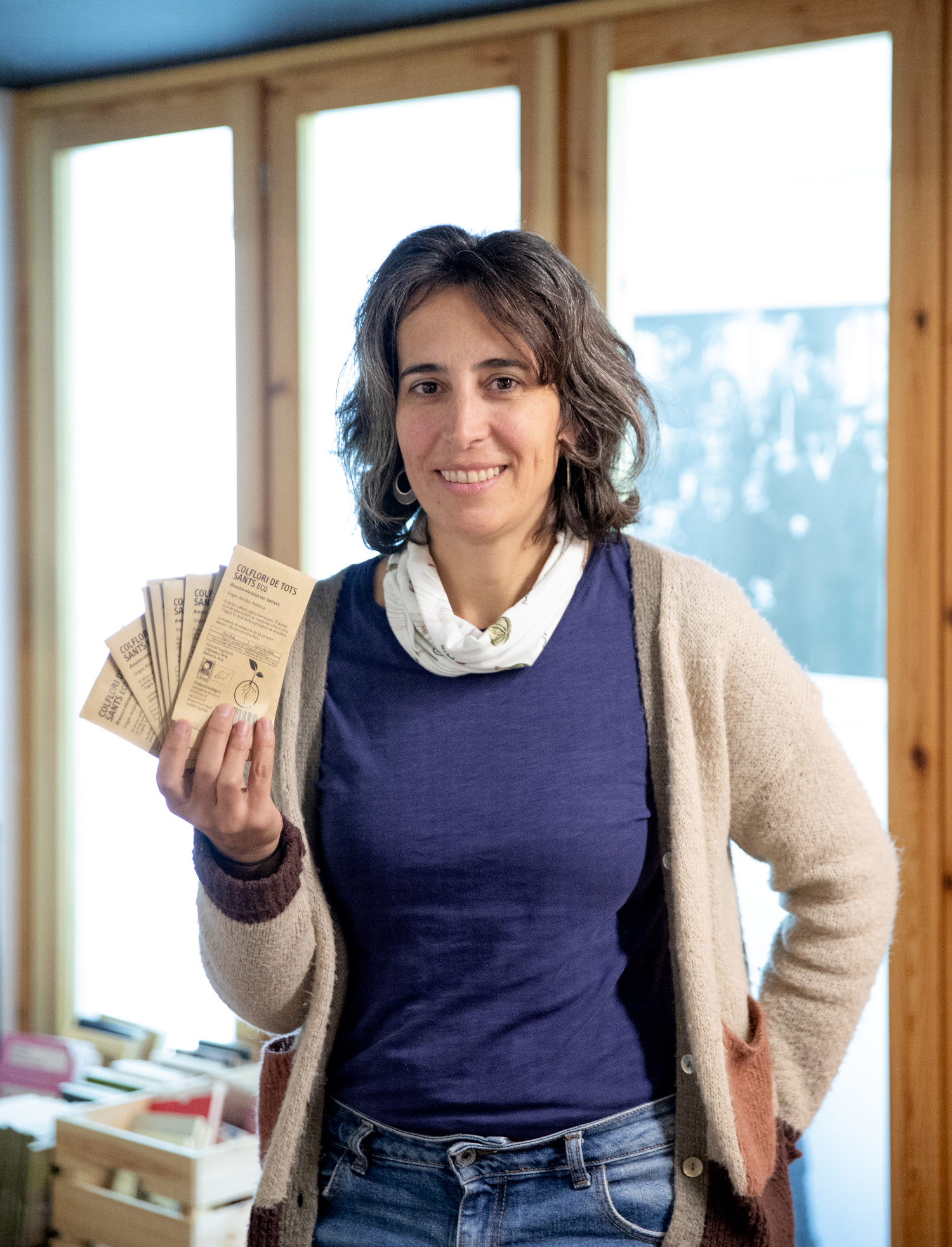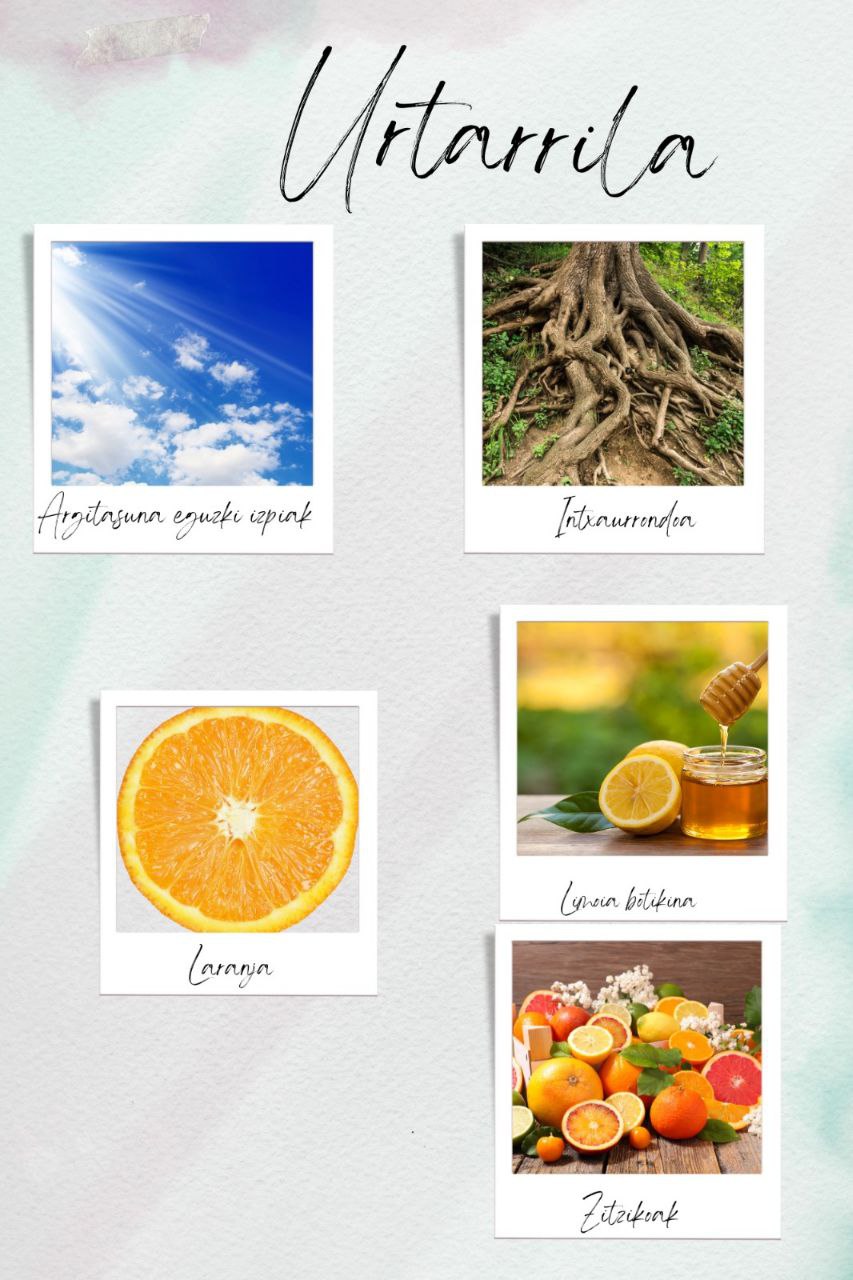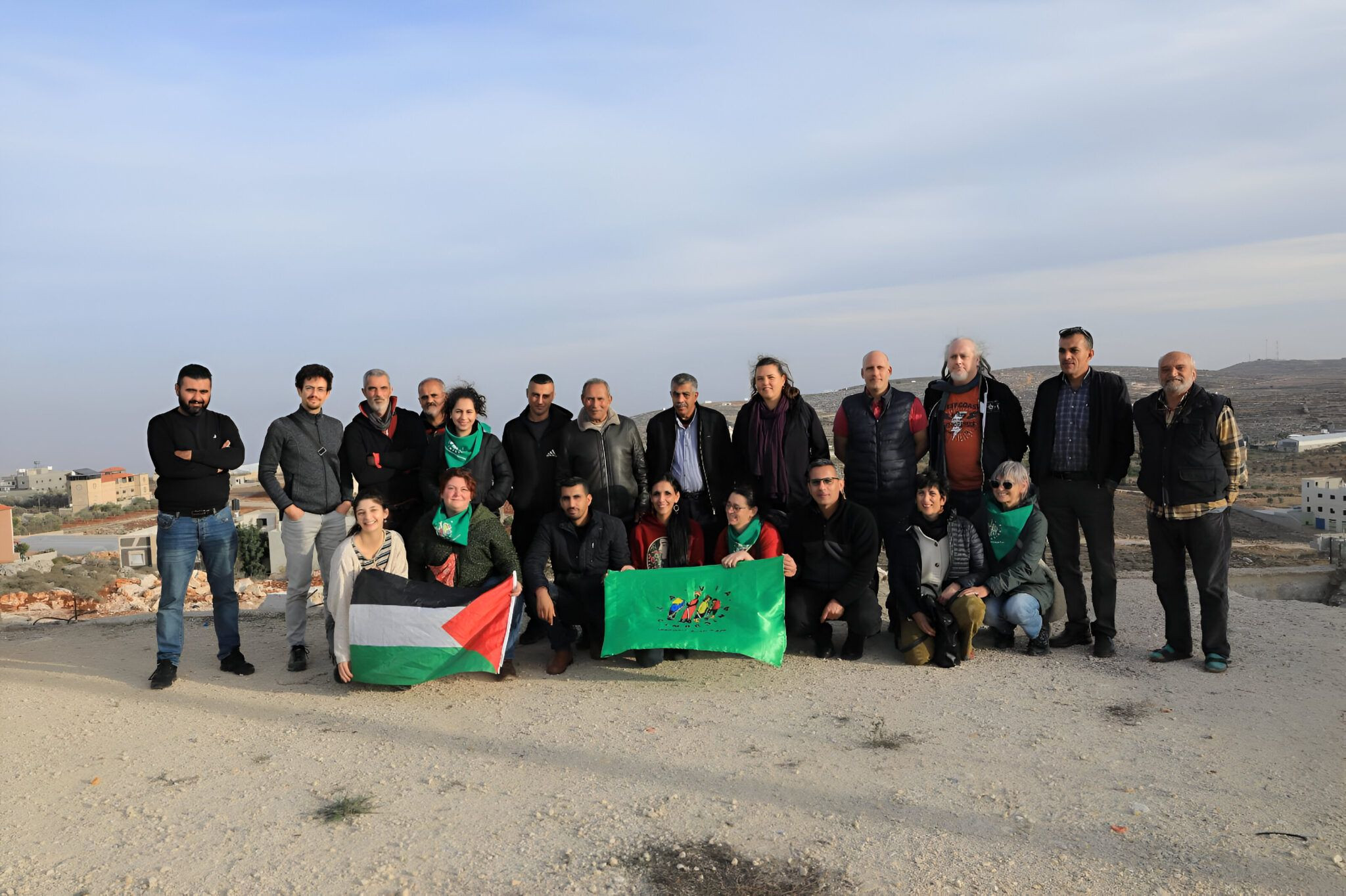A collective land for sowing seeds of hope
- On the Gipuzkoan coast, in the meander of the River Urola is the Amillubi farmhouse and its lands (according to the toponym “Amilibia”). This small nature paradise is located in the Iraeta district. The Biolur Association for Organic Agriculture, which this year is 30 years old, aims to turn this space into a collective good, with a land friendly crop, where farmers can access the land in good condition and citizens, food. The call is open between citizens, institutions and companies for each to protect a square meter of land from Amillubi. With a strategic view, they want to respond from practice to the challenges of the future of food.
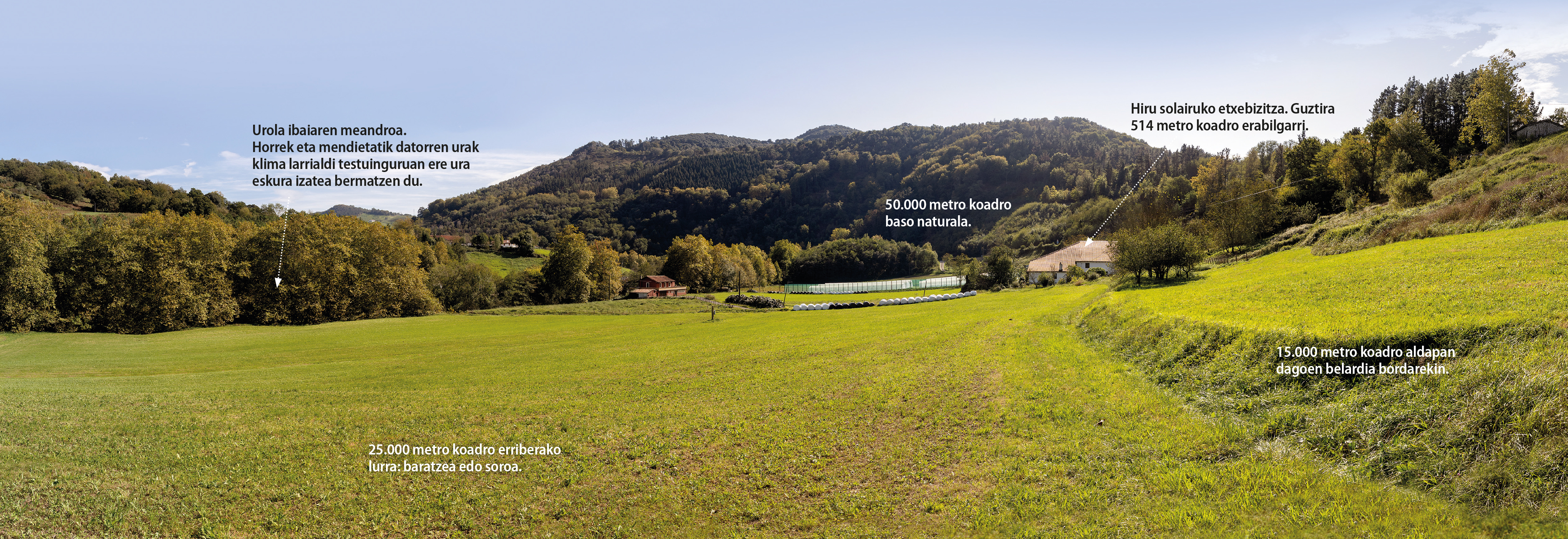
Anyone who has ever been to Amillube does not need a big reasoning in the face of the call to turn this natural heritage into a collective good: there is only feeling the strength of nature. In addition, who better to take care of this area than the hands of cultivators that respect nature? The relationship of the population with this landscape will be constantly strengthened in the Urola valley, every time the healthy food generated in it is made available to the public.
The same practice focuses on the Amillubi project. The table of this report shows the concrete actions to be carried out in Amillubi and the reasons that drive it. But we met with Mirene Begiristain Zubilhgh,Ioritz Aizpuru Goitia and Myrian Imaz Juaristi, members of his promotional team, to learn about the strategic vision behind this project. We asked them what the lands of Amillubi would bring and they would answer us. "Hope. In these times, future projects are really necessary, we cannot stay in the diagnosis. Because, in the light of the diagnoses, there is no reason for this type of project: the difficulties and difficulties that the baserritars have in maintaining their productive projects, the prices of food and the amount that farmers receive ... Amillubi gives hope, this is a strategic project but from practice. It does not alter the structural problems, but it responds to various structural problems in the sector."

The ARGIA reader will often have read these problems: the working conditions of the producers, the lack of relief, the difficulties of access to the land as a consequence of the artificialization and speculation of the land..., so they want to put in Amillubi "tools for the solution of these problems from the practice": "Relief is one of the most serious problems facing the primary sector. People who want to start will be left in good condition in Amillubi, where they will also receive support to start the project. But alongside this, working conditions are another serious problem; people don't stay in farming because there are no conditions. At Amillubi we want to create good working conditions collectively." They have also stressed that the seam of the network between producers and citizens of food is a good contribution.
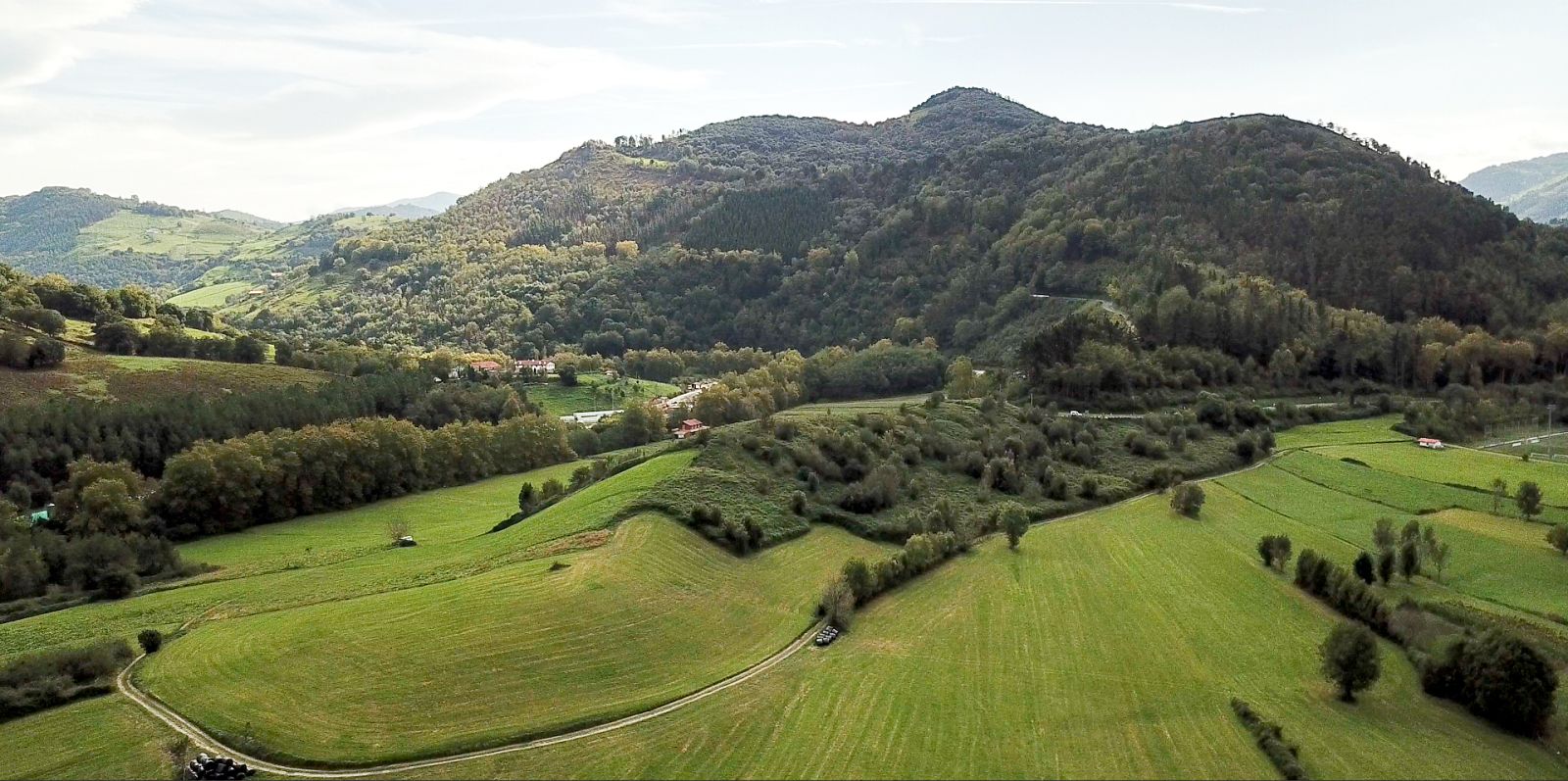
However, they wanted to make it clear that the problem is structural and that they will have to continue to affect at political level: "Public policies are of great importance for the future of the primary sector, and current policies do not respond to these problems. But we can't wait or look outside. We from ourselves and from the small will give some answers with this concrete project, within a strategy, knowing that the structural problems will remain there".
From smallness and practice, what strategy are you going to sow on the ground? "Amillubi offers the Basque Country the possibility of building a strategy of food sovereignty through alliances. We do not have food sovereignty, and in terms of accessibility, we often forget that we do not have guaranteed daily food. If the limits are closed, only 10 percent of what we eat is local. We have defined the strategy of food sovereignty, but we lack structures to give sufficient leaps of scale. Amillubi can give this opportunity if, following the path of the alliances that have been consolidated in Amillubi, Lurzaindia Sur is created".
The Amillubi project was presented to the public on December 1 in Azpeitia and the following presentation is available at the Durango Fair: December 8 at 15:30 in Landako gunea. Work must be done to raise the €390,000 needed for the purchase and repair of land and farmland of Amillubi (see table of economic approach)... and to create Lurzaindia Sur now? It is observed that the primary sector is used to having an eye in the future harvest. They have explained to us in greater depth the opportunity for the future between three members: "We say that Amillubi can be the first step of Lurzaindia Sur. Lurzaindia has a ten year history in the Northern Basque Country, and with the collaboration of different agents they manage to obtain land and make it available to producers. This has allowed the consolidation of new producers in the sector and allowed the existing producers to stabilise their production. Amillubi is our current project, but it can be the first step in bringing the Lurzaindia initiative to the South. We're in touch with Lurzaindia." However, they wanted to make it clear: "This will not just be done by Biolur, it will have to be done with other agents." They say that to start the Amillubi project it is necessary to build alliances, as we will explain later in this report.

Whether or not Lurzaindia Sur is launched, the Amillubi project, which will currently have 90,000 square meters of land, has the opportunity to grow in the future. Because the area that limits its land is the property of the Basque Government: It's 260,000 square meters and they're soils qualified as agricultural. The three members of Biolur are clear: "This gives the whole of Gipuzkoa much food. Every meander can be an important point of food production. It will be a path that must be promoted from public policies and Biolur, depending on its possibilities, will be willing to participate and be encouraged".
30th anniversary of Biolur
The Amillubi project has been launched on the 30th anniversary of Biolur. Remember Biolur's extraordinary meeting in Aizarnazabal to decide whether or not to continue with Amillubi: "Seeing with enthusiasm, making a collective decision and feeling supported in that assembly to the members of the Biolur foundation 30 years ago gives us security." But to reach the decision, several members of Biolur and its creators acknowledge having eaten several beans: "We needed to share, the decision has taken time. The founders of Biolur 30 years ago bet without network and now we are going to make a new leap, but in the collective and with the network. It's exciting to see which network we've built over all these years. Even though we give vertigo, we don't go alone."

Production Agents project: Ekolurra, Lurzaindia, EHKOreader, Errez, Kimubat, Alkartasuna, Tantai, Leartiker · Kontsumo Elkartea: Feeding area, Ereindajan, Lakari, Biziola · Public bodies: Municipalities of Udalbiltza and Zestoa, Azpeitia, Aizarnazabal, Zumaia and Oñati · Social economy agents: Olatukoop, Goiener, Coop57, Talaios · Media: ARGIA, Berria, Danbolin, Urola Komunikazio Tallinn · Social partners: Alameda · And slopes: Photo: Dani Blanco / ARGIA CC-BY-SA.
The Network has been weaving year after year through collaboration, as Biolur has chosen to develop projects with other actors: "The current network is the result of the path traveled for years. At the moment, an alliance has been created that has made it possible to undertake Amillubi, but not from scratch, but through the paths that we have travelled in recent years. With consumer associations, city councils, social agents, institutions, agents of transformative social economy -- we've already developed projects and that force has come together in Amillub. In addition, this already created network has been reinforced with the Amillubi project, articulated". In the table of this report you can read the alliances that have taken place at the moment in Amillubin, and the members of Biolur are still expanding much more.
Biolur is strong on his anniversary: It has over 320 partners, half of whom are baserritars and the other half citizens and agents. For those who want to meet Biolur and for those who want to give permanent support to Amillubi as a partner, they have their doors open.
Violur is strong and seasonal, yes, and gives joy to see the profile that leads the work team of the Amillubi project: women* peasants and/or youth.
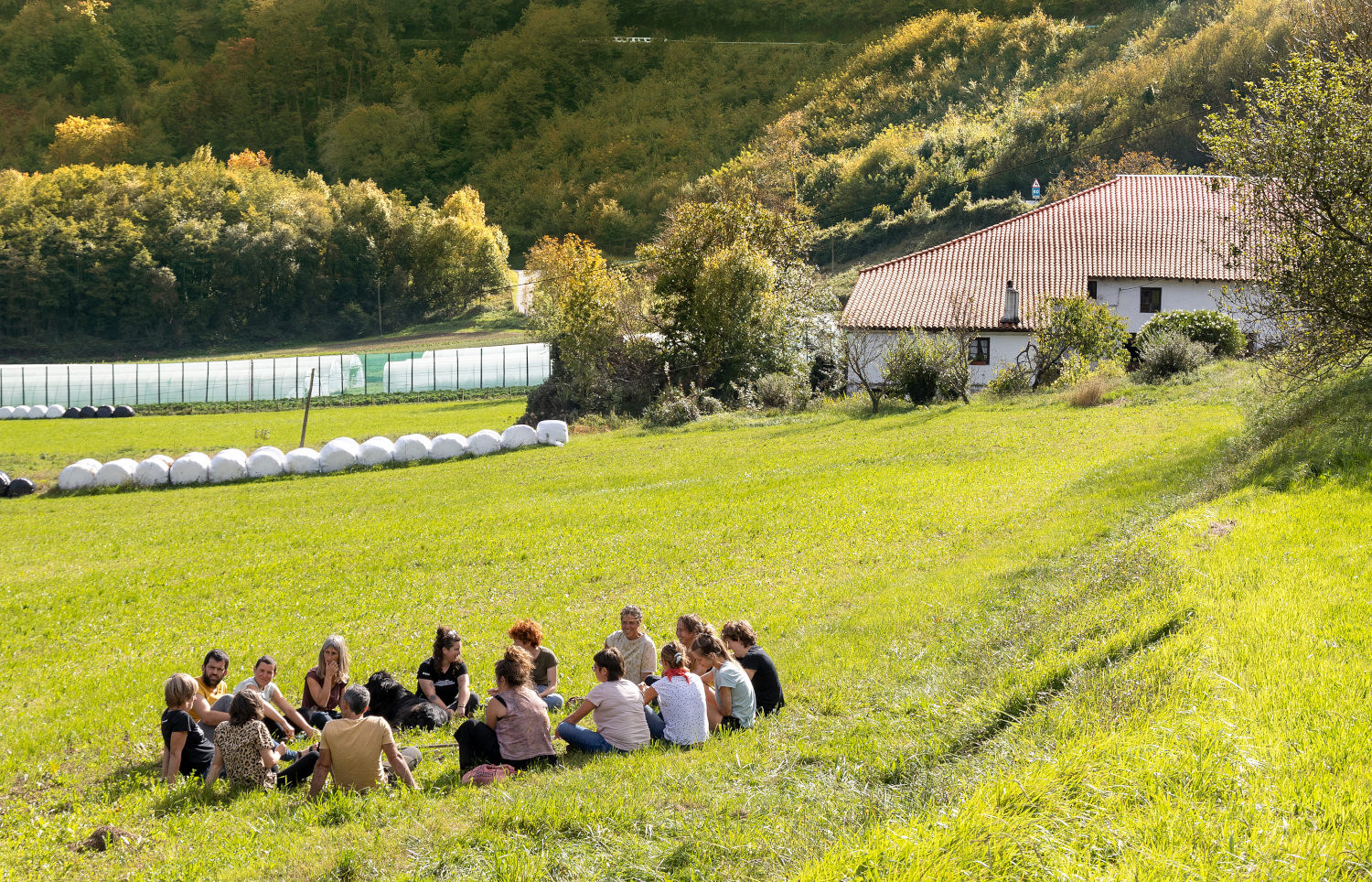
“There are no other lands of this kind in Gipuzkoa”
Amillubi is a place rich in biodiversity. The U-shaped meander of the Urola River is a unique population nucleus. The three members explained this to us: "The lands on the bank have always been fertile. The soils of Amillubi are of great agroecological value, they are very deep and even if they are next to the river there is no danger that this area will be flooded". Besides fertile land, the other treasure of Amillubi is water: "In the context of the climate emergency, water is a big problem and in Amillubin water is more secure because it is located in the meander and also receives mountain waters."
They warn that there is currently no land in Gipuzkoa with these conditions of cultivation: an extensive and plain terrain, fertile and well located logistically to facilitate the transport of the food generated in it to the population... What has happened to the fertile lands of our peoples to make Amillubi an exception today? "Our best agricultural land has been artificialized to build houses, businesses, roads and infrastructure. Priority is given to other uses and agriculture is not considered strategic. The best agricultural lands have gone to housing, industry and mobility, especially in Gipuzkoa, Bizkaia and Nafarroa Garaia and Lapurdi".
Agroecology, feeding the future
It is significant that at the end of 2023 two strategic projects began in Gipuzkoa: one in Amillubi, agroecological, based on the collectivization of the land and aimed at food sovereignty. And the other in the technological park of San Sebastian, the largest multinational in the meat industry worldwide, based on biotechnology, proud to be the synthetic meat and the one that matters most at European level. The feeding of the future is at stake at the moment.
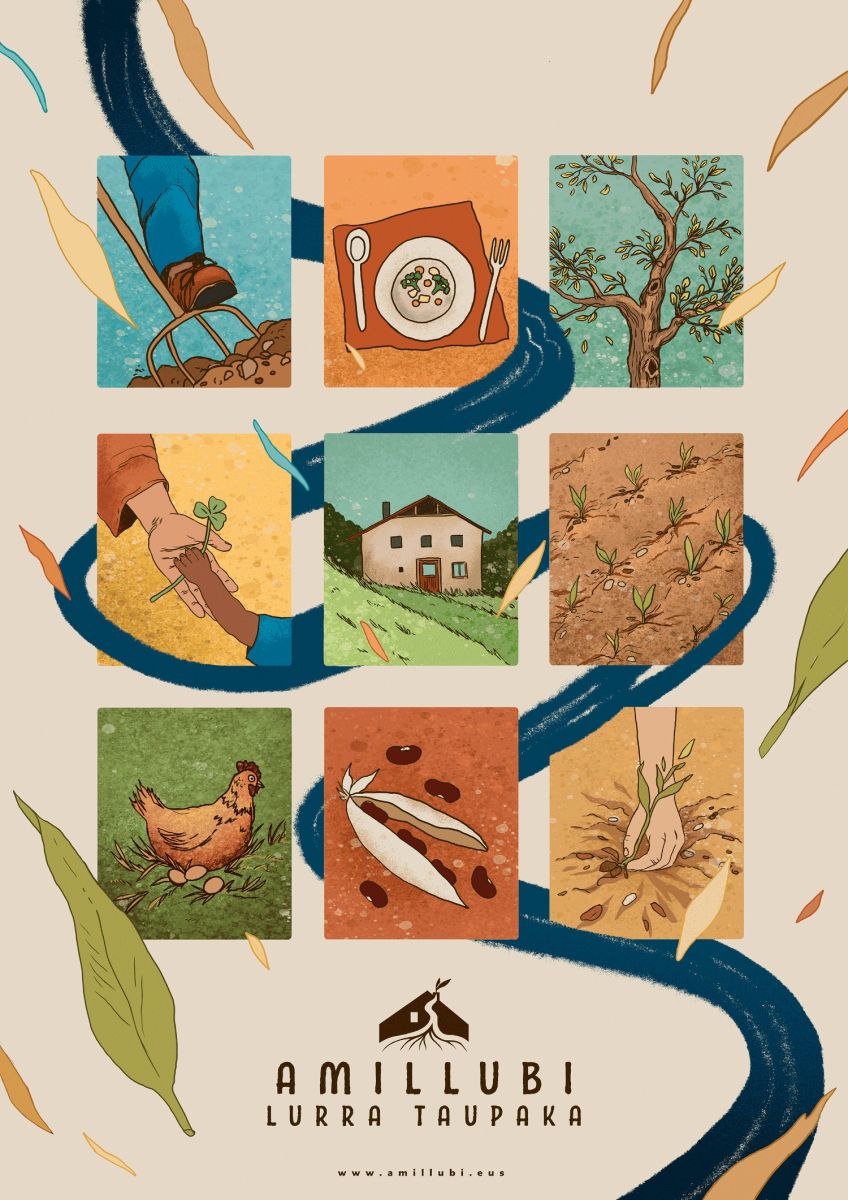
Take the floor: "It is clearer than ever, in this context of climate crises, energy crises, etc., that we must create our food in land-friendly ways. So we have to do agroecology. Synthetic meat, food produced in the lab -- it's more important than ever to start alternatives."
Myrian Imaz follows: "I don't understand otherwise, it's real foods that I want for my children and not processed, artificial and emerging foods. I move especially. Seeing that we have more and more health problems in the area... the responsibility for health must be each and that brings me to the roots and the small. We have to demolish many structures and build new ones with common sense."
Mirene Begiristain adds: "When Biolur was born 30 years ago, creators tell them how they looked at them as hippies, and by then in Europe things moved in organic farming, those here looked at those referents. During these years, much has been learned and advanced technically. Agroecology puts on the table, in addition to the ecological mode of production, other dimensions: selling in it, in decent conditions, taking care of our culture... At present, the European Declaration also recognises agroecology as a road and the Food and Crop Organization of the United Nations (known as FAO) says that agroecology is the way forward internationally. But the clash of two production and food models is evident; as at the time when they called it the green revolution in the 1970s, agroecology continues to clash with other interests. When they raise artificial meat, they drive the path of biotechnology... they are oriented to other interests, they are not oriented to the care and health of the planet and people".
What about you? What kind of food, cultivation and environment do you want for the future? One step to working this future can be the protection of a square meter of soil from the Amillubi project (see routes in the table).
Why Amillubi?
1 / Responds to the soil need of the primary sector under very favorable conditions.
2 / It is an area of high agroecological value, with very fertile and plain soils.
3 / In the meander of the river Urola water is available.
4 / Logistically it is very well positioned to distribute the food generated in the establishment.
5 / In Gipuzkoa there is not much ground to work in these conditions.
6 / The lands that limit with Amillubi allow for future project growth: It is an area of 26 hectares, owned by the Basque Government, classified as agricultural.

What is going to be done there?
1 / It will land producers (already food producers or new ones) in good condition.
2 / They want to create decent working conditions for farmers collectively.
3 / Create food: Provision of the Urola Valley food system.
4 / Concrete projects are now being studied to decide how to start land in spring. The Biolur producers have proposed a number of projects to meet their needs, which may be those carried out first in Amillubi.Se have identified the
following projects that can be worked out later:
5 / Put organic plant nursery.
6 / Have an experience space of agroecological cultivation.
7 / Have space to store the common equipment.
8 / Be food supply point.
9 / Perform the job function for those who want to start in the crop.
10 / Conduct training and awareness sessions.
11 /...
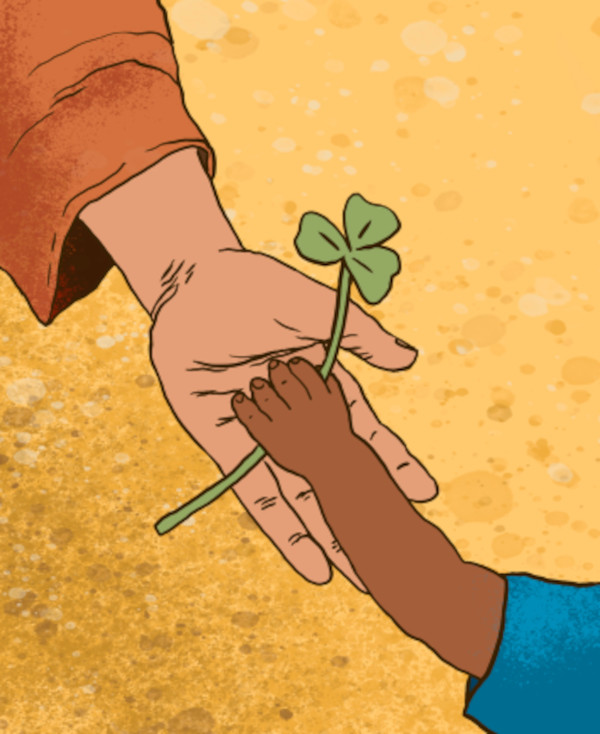
Reach 390,000 euros: protect a square meter of land
The Biolur association for organic farming wants to buy the Amillubi farmhouse and its lands without debt with the banks. It needs EUR 390,000 for the purchase and reform of the farmhouse. Biolur members appreciate the attitude of the family that sells them to Amillub: "He has not speculated on the land and has always had a great disposition to facilitate payment. We will pay it in two years, in several instalments. This has facilitated the possibility of various initiatives to raise money over time".
To complete this figure, they first came to Biolur, a partner made up of landlords, neighbors and agents. Subsequently, support has been sought from several municipalities as well as companies.
Citizens are now invited to support a square meter of Amillubi until May, providing between 50 and 100 and 200 euros or the amount desired. To this end, they have organised with Coop57 the campaign to raise funds over the internet and the contribution can be made easily by accessing the website www.amillubi.eus. Whoever chooses can make their contribution directly to the current account: ES37 1550 0001 2400 1666 3726. The Bonolaguntza have also been launched, which can be purchased on the portico during the days of the Durango Fair. Another way to support the project may be the organization of initiatives in municipalities to raise funds in favor of Amillubi.Biolur aims to raise 150,000 euros until May
with the contributions of citizens. Meanwhile, it will continue to build alliances with more municipalities, institutions and companies.
Bizkaigane elkarteak elikadura burujabetzan oinarritutako proiektua du Errigoitin (Bizkaia), 1983tik. Instalazioak dauden lur eremutik aterarazi nahi du lur jabeak elkartea. EHNE Bizkaia sindikatuak adierazi duenez, instalazioek lege eta administrazio eskakizun guztiak betetzen... [+]
Martxoaren 10etik 26ra izango da udaberriko kanpaina. 'Beste modura, denona de onura' lelopean arituko dira gertuko ekoizpena, banaketa eta kontsumoa babestu eta sustatzeko, ager zonaldean euskara hauspotzen duten bitartean. Apirila amaieratik aurrera jasoko dira... [+]
Euskal Herriko bi muturretatik datoz Itziar (Bilbo, 1982) eta Ekaitz (Erriberri, 2002), sortzen ari den Burujabetzaren Aldeko Mugimenduaren berri ematera. Euskal Herrian diren burujabetza prozesu ugariak arloz arlo bultzatu eta indartu nahi ditu BAMek. Lan horretan hasteko,... [+]
Emakume bakoitzaren errelatotik abiatuta, lurrari eta elikadurari buruzko jakituria kolektibizatu eta sukaldeko iruditegia irauli nahi ditu Ziminttere proiektuak, mahai baten bueltan, sukaldean bertan eta elikagaiak eskutan darabiltzaten bitartean.







